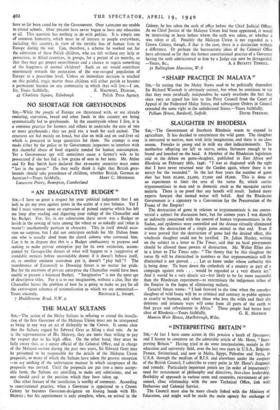SLAUGHTER IN RHODESIA
SIR,—The Government of Southern Rhodesia wants to expand its agriculture. It has decided to exterminate the wild game. The slaughter is entrusted to natives, men with little imagination, and there is no close season. Females in young and in milk are shot indiscriminately. The motherless offspring are. left to starve, unless fortunate enough to be found and knocked on the head. A Member of the Rhodesian legislature said in the debate on game-slaughter, published in East Africa and Rhodesia on February 28th, 1946: " I was so disgusted with the sight that I have never returned near the Cordon again, where there is no mercy for the wounded." In the last four years the number of game shot has been 20,000, 25,000, 27,000 and 28,000. This is done as an experiment to limit the area of the tsetse fly, which carries trypanosomiasis to man and to domestic stock as the mosquito carries malaria. There is no proof that any benefit will result. Indeed many experts forecast that instead worse will befall. And the Rhodesian Government is a signatory to a Convention for the Preservation of the Fauna of the Empire!
The destruction of game in relation to trypanosomiasis is too contro- versial a subject for discussion here, but for sixteen years I was directly or indirectly concerned with the control of human trypanosomiasis in the Sudan, and epidemics were controlled and the disease virtually eliminated without the destruction of a single game animal to that end. Even if it were proved that the destruction of game had the desired effect, this wholesale slaughter could not be justified. Dr. Julian Huxley, writing on the subject in a letter to The Times, said that no local government should be allowed those powers of destruction. Mr. Walter Elliot also in a letter to The Times says: " The theory that by this slaughter the tsetse fly will be diminished in numbers or that trypanosomiasis will be diminished is not proved. . . . Let us know under whose authority this is being done. To burn down the cathedrals of a country as part of a campaign against owls . . . would be regarded as a very drastic act." And it would be a very drastic act—but likely to be far more successful than the Rhodesian experiment—to exterminate the indigenous tribes of the Empire in the hopes of eliminating malaria.
General Smuts wrote: "I look forward to the time when the senseless slaughter of wild fauna will be as criminal and contrary to public opinion as cruelty to humans, and when those who love the wilds and their shy denizens and intimate ways will come from all parts of the earth to find peace and refreshment in Africa." Those people had better keep clear of Rhodesia.—Yours faithfully, G. K. MAURICE. Manton Weir House, Marlborough, Wilts.






























 Previous page
Previous page